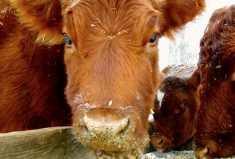The regulatory path has been cleared to resume exports of live Canadian cattle to the Philippines, reopening a market worth an estimated $8 million per year.
The federal government on Monday announced the resumed export clearance, along with new market access for Canadian sheep and goat genetics exports to both Indonesia and the Philippines.
The government quoted the Canadian Livestock Genetics Association as valuing the export market for live cattle to the Philippines at an estimated $8 million, and the markets for Canadian sheep and goat genetics in Indonesia and the Philippines at up to $100,000 a year.
Read Also

New opportunities for Canadian goods in Mexico
Agriculture minister’s trip to Mexico sees promotion of Canadian goods like beef and canola, with potential for more partnerships in the future
The Philippines had shut its ports to live Canadian cattle in 2003, following the discovery of Canada’s first domestic case of bovine spongiform encephalopathy (BSE) in an Alberta cow. Post-BSE access for live Canadian cattle resumed in 2012.
But the Philippines’ export certificate for live Canadian cattle was again suspended in September 2015, following detections in southwestern Ontario of bluetongue-seropositive cattle, which cost Canada its bluetongue-free status.
Meanwhile, a government spokesperson said Wednesday, the work to open the two markets for small ruminant genetics was undertaken in response to requests from Canadian industry and exporters to “access these markets and seize business opportunities.”
Exports of Canadian breeding cattle and genetics “will also contribute to rural economic development efforts of the Philippines in the agriculture sector,” the Canadian government said Monday in a release.
The Canadian cattle sector’s post-BSE access in the Philippines has otherwise gradually reopened, as the country again allowed imports of Canadian beef in 2007 and of Canadian rendered meat and bone meal in 2010.
These market access gains are also “setting the stage for deeper bilateral economic relations” between Canada and the ASEAN (Association of Southeast Asian Nations) region, federal Agriculture Minister Lawrence MacAulay said in Monday’s release.
The ASEAN, combined, ranks as Canada’s sixth-largest trading partner, the government said. Last year, it noted, the Philippines alone accepted over $325 million in Canadian ag products and exported over $185 million in ag goods to Canada.
Canada and the ASEAN in September last year launched exploratory talks toward a possible free trade pact. That trade bloc would include Cambodia, Indonesia, Laos, Myanmar, the Philippines, Singapore and Thailand, as well as Vietnam, Malaysia, Singapore and Brunei, which with Canada are also members of the Trans-Pacific Partnership. — Glacier FarmMedia Network












